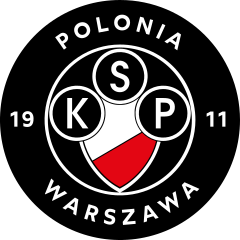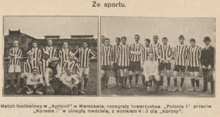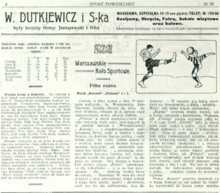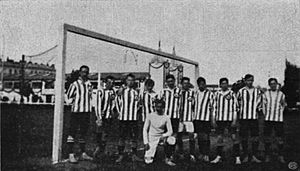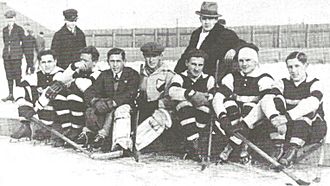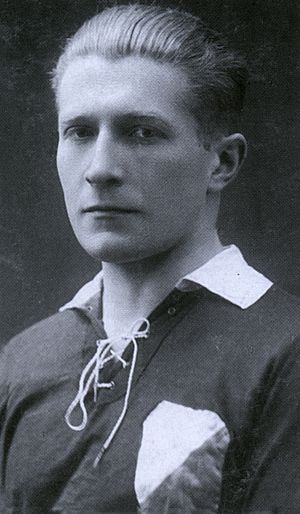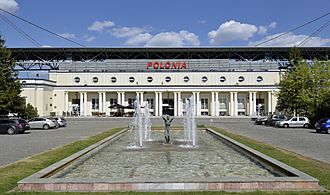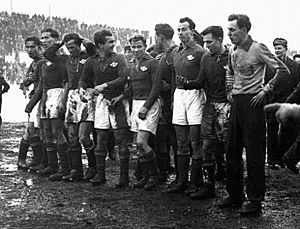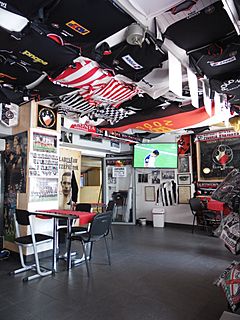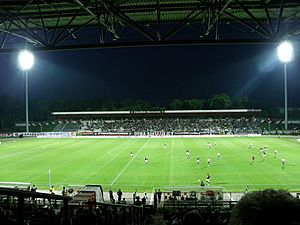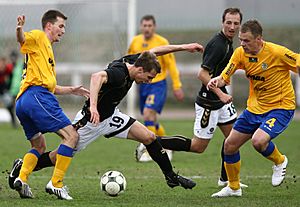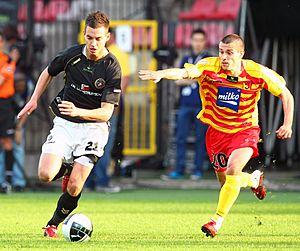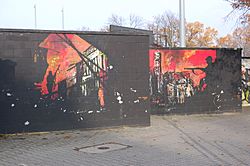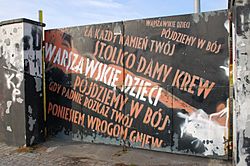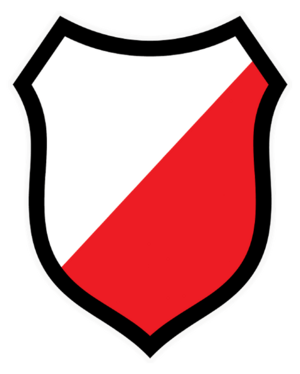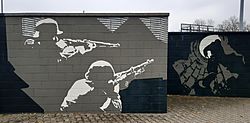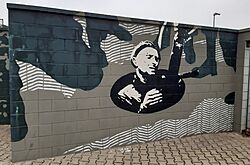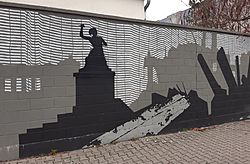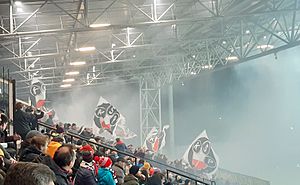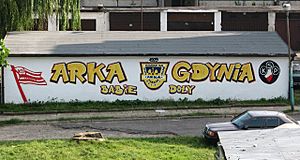Polonia Warsaw facts for kids
Polonia Warsaw (Polish: Polonia Warszawa) is the oldest sports club in Warsaw, the capital of Poland. It was founded on November 19, 1911. The club is most famous for its football and basketball teams. Polonia Warsaw also has sections for track and field, swimming, chess, mountain biking, and contract bridge. In the past, it also had teams for ice hockey, fencing, tennis, volleyball, and boxing.
The football team currently plays in the I liga. This is the second-highest level of football in Poland.
Contents
Club History
Early Years: 20th Century
How Polonia Warsaw Began
Polonia Warsaw started in the autumn of 1911. It was a mix of several school teams. Co-founders included Wacław Gebethner and Stefan Pronaszko. Wacław "Denhoff" Czarnocki helped create the club and gave it its name. "Polonia" means "Poland" in Latin. It was a brave choice because Poland was not an independent country then. Warsaw was under Russian rule. Poles faced harsh treatment from the Russian authorities. Because of this, Polonia could not be officially registered. This changed when German troops arrived during World War I.
At first, players wore black-and-white striped shirts. In 1912, they switched to all-black shirts. This was thanks to Janusz Mück, a long-time player. The black color became a symbol of mourning for Poland. This tradition led to the club's nickname: Czarne koszule ("The Black Shirts"). The team's white shorts and red socks come from the Polish flag.
Polonia's first match was on November 19, 1911. They played against Korona and lost 3:4. Two years later, in 1913, Polonia beat Korona 4:0. German occupiers allowed sports clubs to register. So, on October 15, 1915, Polonia officially became a football club.
The first match between Polonia and Legia Warsaw was on April 29, 1917. It ended in a 1:1 draw. This was the first "Great Derby of Warsaw." These two teams from the capital became big rivals. Their rivalry continues to this day. It creates strong emotions during matches.
Between the World Wars
In 1921, Polonia finished second in Poland's first football championship. In 1926, they were also joint-champions. Polonia was Warsaw's most popular club back then. Many people in the city supported the Black Shirts. In the late 1930s, Polonia became a strong team. Players like Władysław Szczepaniak played for the national team. Polonia and KS Cracovia became friends. Both teams welcomed players from different backgrounds.
Polonia had many successes between the world wars. The club had sections for hockey, athletics, football, fencing, tennis, volleyball, basketball, swimming, and boxing. The official Warsaw derby started on June 10, 1921. Polonia beat Legia Warszawa 8:0. The rivalry grew, with Polonia winning more matches. Polonia's own stadium began construction in 1925. It was finished in 1928. In 1938, Polonia was named the best Polish sports club.
World War II and Its Impact
During World War II, Poland was occupied. German forces banned Poles from playing sports. But Polonia continued to play secretly. They won the secret Warsaw Championship in 1942 and 1943.
Many Polonia players joined the resistance movement. Some died in concentration camps. Others were executed or survived. Tadeusz Gebethner, a club founder, was one example. He joined the resistance in 1940. He even hid a Jewish family in his home. He fought in the Warsaw Uprising and was wounded. He died in a prisoner-of-war camp in 1944. He was later honored for helping Jews.
Some pre-war Polonia players were killed by Russians. This happened in the Katyn massacre in 1940.
Polonia's Kazimierz Sosnkowski Stadium was badly damaged during the war. Polish fighters used it as a battlefield. The stadium was rebuilt by the 1950s. Murals honoring Polish resistance fighters are painted on the stadium walls.
First Championship and Polish Cup
In 1946, Polonia won the Polish Championship. This was very meaningful among the ruined buildings of Warsaw. The final match was played at Legia's stadium. Polonia's own stadium was destroyed. The Black Shirts defeated AKS Chorzów in the final.
During the Stalinist period, Polonia's name and colors were changed. The club was renamed Kolejarz ("Railroad worker"). This was because it was linked to the Polish State Railways. The railroad was not a rich sponsor. Polonia's management also faced many problems. This led to the team being moved down to the second division. The traditional black shirts were banned. The Stalinist government wanted to remove anything from pre-war Warsaw.
In 1952, Polonia Warsaw won their first Polish Cup. They beat local rivals Legia Warsaw 1:0 in the final. This made Warsaw fans very happy. Polonia remained popular until the 1960s. After Stalin's death, Polonia returned to its original name in 1956.
For 40 years, Polonia played in lower leagues. Legia became more popular and successful. Many young, talented players were forced to join the army. They often ended up playing for army-sponsored Legia Warsaw. Polonia fans believe this helped Legia become so popular.
Back to the Top League
In the 1992–1993 season, Polonia Warsaw was promoted to the first division. This was after 40 years in lower leagues. But the club lacked money and a good training base. They were moved down again after one season. However, they were promoted again in the 1995–1996 season. In 1996, Janusz Romanowski became chairman. He helped Polonia return to the Ekstraklasa, Poland's top league. In 1998, the Black Shirts finished second. In 1999, they reached the semi-finals of the Intertoto Cup.
21st Century Successes and Challenges
Winning More Titles
In the 1999–2000 season, Polonia was not expected to win. But they led the league by winter. The team had two managers: Jerzy Engel and Dariusz Wdowczyk. Polonia signed talented players like Tomasz Wieszczycki. They also got sponsorship from Hoop Cola. In the spring, Polonia lost only two games.
KSP won the Polish Championship in 2000. They beat Legia Warsaw 3:0 at their rival's stadium. Before that, they won the League Cup, beating Legia 2:1. In July, they won the Super Cup against Amica Wronki 4:2. This was also the time of Emmanuel Olisadebe. He was a Nigerian footballer who became a Polish citizen. He played for the national team and became a legend. He was the first black player on the Poland national team.
In the UEFA Champions League qualifiers, Polonia won against Dinamo București. But they lost to Panathinaikos Athens. Polonia then played in the UEFA Cup. They lost to Udinese Calcio.
In the 2000/2001 season, Polonia's form dropped. They played poorly in the first division. But they still managed to win the Polish Cup. For a few years, Polonia stayed in the top division. However, they usually finished near the bottom. During this time, Jan Raniecki, a club supporter, owned the club. He passed away in 2006. His family did not want to run the club. So, a search for a new owner began.
The JW Era Begins
In March 2006, Józef Wojciechowski bought the club. He owned JW Construction, a large housing company. The club's money situation improved. It seemed Polonia would become strong again. But the club was moved down to the second division in 2005/2006.
In the 2006/2007 season, Polonia tried to get promoted. They came close but finished sixth. There were rumors that some older players did not want promotion. In 2007, a bar called Czarna Koszula (Black Shirt) opened at the stadium. It was for fans and had club memories. This pub became a popular meeting place for fans and players.
In July 2008, Polonia Warsaw joined with Dyskobolia Grodzisk Wielkopolski. Polonia took Dyskobolia's place in the top division. Most of Dyskobolia's players moved to Warsaw. Polonia finished 4th in the 2008/2009 season. They reached the third qualification round of the UEFA Europa League. After winning two matches, Polonia lost to NAC Breda from the Netherlands.
In 2009/2010, the team was not doing well. Józef Wojciechowski hired José Mari Bakero, a former FC Barcelona captain, as manager. Bakero helped the team avoid being moved down. He also led Polonia to a win against Legia Warszawa. This was Polonia's first home win against Legia in 60 years. Fans were very excited.
100th Anniversary and Changes
For Polonia Warsaw's 100th anniversary in 2011, Józef Wojciechowski strengthened the team. He signed six new players, including Ebi Smolarek. Fans had high hopes for the season.
The season started well with three wins and a draw. Polonia was in first place. But there were problems between the owner and the coach. After a loss, Józef Wojciechowski and José Mari Bakero parted ways. Paweł Janas, a former Polish national team manager, took over.
Things got worse for Polonia. The team played poorly. On January 6, 2011, Theo Bos became the new manager. He lasted only five matches. Assistant coach Piotr Stokowiec took over briefly. Then Jacek Zieliński was appointed. Polonia won five of seven matches under Zieliński. They avoided being moved down and finished 7th. In June 2011, Polonia sold star player Adrian Mierzejewski. He was sold for a record fee in Polish football history.
In 2011, the National Bank of Poland released special coins. They celebrated Polonia Warsaw's 100th anniversary. This was the first time a football club in Poland received such an honor.
On March 28, 2012, Czesław Michniewicz became manager. Polonia won his first game 3:0. But they had poor results after that. They failed to qualify for the European league. Józef Wojciechowski decided to leave football. He sold the club to Ireneusz Król in July. Many players left the team. The "JW era" ended, causing anger among fans.
A New Start and New Challenges
On July 24, 2012, Ireneusz Król bought the rights to Polonia's name and emblem. He kept the club in its place. Youth coach Piotr Stokowiec became the first team coach. He built a new team with remaining players and young talents.
However, Król was not a reliable owner. Payments to players were delayed. In 2013, Polonia lost more than half of its first team. Many high-priced players left for free. Some joined rival teams like Legia Warsaw. Polonia was left with few players.
Despite problems, the team played well. But off-field issues caused poor results. On April 3, 2013, Król's company filed for bankruptcy. Debts grew, and Polonia's future was uncertain. On May 28, 2013, Polonia did not get a license for the next season. This was due to a large debt. The club lost its place in the Polish football association. On June 17, 2013, Ireneusz Król filed for Polonia Warsaw's bankruptcy. Even though they finished 6th, KSP dropped five league levels. This was the lowest point in its 101-year history.
Rising Again
On June 20, 2013, a new Polonia Warsaw team was formed. It was created by a group of supporters. They used youth players from MKS Polonia Warsaw. The team was placed in the 6th tier of Polish football. Later, it was moved up to the IV liga (5th tier).
Piotr Dziewicki became the new manager. He and sports director Paweł Olczak signed 26 players. Many had played for Polonia before. The club got control of its stadium back. They also returned to their historical crest. The team wore black-and-white striped shirts, like in the early days.
The new team's first game was in Łomianki. It started well, with Polonia scoring two goals. But the game was stopped after 36 minutes. This was due to problems with hooligans.
However, a week later, on August 25, 2013, Polonia had a great debut. The stadium was almost full. Polonia Warsaw beat Wkra Żuromin 6:0. Michał Strzałkowski scored three goals. Polonia quickly won promotion to the III liga in June 2014.
Piotr Dziewicki left the club. Other coaches came and went. Some strong players also left. Club legend Igor Gołaszewski became head coach. He won five of his six games. In the 2014/2015 season, the club finished just above the relegation zone.
Jerzy Engel's Leadership
On June 25, 2015, Polonia Warszawa S.A. took over the senior team. This was under the leadership of Jerzy Engel. The club returned to its old emblem and sponsor.
The team's core players stayed. Igor Gołaszewski remained as coach. Former players like Wojciech Szymanek returned as coaching staff. The club signed four experienced offensive players. Polonia Warsaw announced plans to build a modern stadium by 2020. They also aimed to return to the Ekstraklasa.
In late 2018, Jerzy Engel resigned. The club was not very successful. Its finances also got worse. The city authorities were not interested in building a new stadium. However, the president of Warsaw announced a design contest for a new stadium. Money was set aside for the project. In May 2019, JSK Architekci won the contest. They designed a 15,500-seat stadium.
Meanwhile, Polonia's finances suffered more. The new chairman could not bring stability. Polonia was again close to bankruptcy. Many players left the club. Coach Krzysztof Chrobak also left.
"Bonjour Grégoire" Era
In February 2020, Grégoire Nitot began talks to take over Polonia. He is the chairman of an IT company. Some rival fans tried to create negative publicity. But the Polish football community supported Nitot with the "#BonjourGregoire" campaign. On March 5, 2020, Grégoire Nitot bought Polonia Warsaw. He became chairman on March 19. Football stopped due to the Coronavirus pandemic. Polonia was in the relegation zone. Wojciech Szymanek remained coach. On April 30, Piotr Kosiorowski became sporting director. They announced plans to reach the Ekstraklasa by 2029. No teams were moved down that season due to the pandemic.
After play resumed, Polonia finished 4th in the 2020–2021 season. In August 2021, Polonia started its women's football section again. This was after 64 years. The women's team is called Czarne syrenki ("Black Mermaids"). They won their first matches.
November 2021 marked Polonia's 110th anniversary. The club and fans celebrated loudly. Poczta Polska (Polish Post) issued a special postage stamp. Fans recorded a new song. Famous buildings in Warsaw were lit up in Polonia's colors. Messages were shown on public transport screens. Polonia won a match 2:0 on the anniversary day. They finished the autumn season in second place.
The Polonia men's basketball team was promoted to the first league. They won 36 games in a row. The 2021/2022 season brought more success. The men's football team finished first in their group. They returned to the II liga after five years. A sold-out match against Legionovia Legionowo attracted 5000 fans. Polonia won and took the lead. The U12 team, women's team, and men's reserves also moved up to higher leagues. In the 2022/2023 season, Polonia Warsaw was promoted to the I liga. They secured the title by defeating Olimpia Elbląg 2–0.
In the 2024/2025 season, the main KSP team finished 6th. They qualified for the playoffs for a chance at promotion. However, they lost in the semi-final against Wisła Płock. The club's U-17 team won the Polish championship. They defeated Raków Częstochowa in the final.
Supporters and Rivalries
Club Friendships
Polonia and KS Cracovia used to have the oldest friendship in Poland. It started in the 1930s. While officially ended in 2017, friendly relations between fans continue. Polonia fans are also friends with fans of Sandecja Nowy Sącz and Real Zaragoza. A group of Polonia supporters called "Black Rebels" had links with anti-discrimination supporters from other clubs.
Fan Support
The shirt number 12 is saved for the club's supporters. This shows how important they are.
Famous supporters include Doman Nowakowski and Jan Englert. Adam Bahdaj wrote a famous book called Do przerwy 0:1. It is about children playing football, inspired by Polonia's team.
In the 1990s, some Polonia fans formed a group. They were called "Polonia Fans Against Discrimination." This group, later known as "Black Rebels," stood against negative behaviors in football. They received support from fans across Europe.
In 2004, Polonia fans adopted a black jaguar from the Warsaw Zoo. Her name was Beata. They renamed her Beata Konwiktorska VI. She became a popular club symbol. She passed away in 2020.
Warsaw Derby
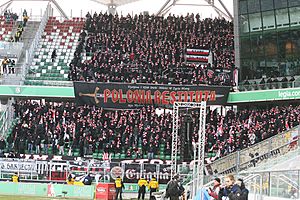
Polonia's main rival is Legia Warsaw. Their matches are called the Warsaw derby. For many years, both teams played in Poland's top league. After Polonia was moved down in 2013, games against Legia Warsaw II became a substitute.
Here are the results of all matches between them:
| All matches | |||
| Matches | Legia wins | Draws | Polonia wins |
|---|---|---|---|
| 78 | 29 | 20 | 29 |
Club Achievements
National Titles
- Ekstraklasa (Top Polish League)
- Champions: 1946, 1999–2000
- I liga (Second Polish League)
- Champions: 1992–93 (East), 1995–96 (East)
- II liga (Third Polish League)
- Champions: 2022–23
- III liga (Fourth Polish League)
- Champions: 2021–22 (group I)
- Polish Cup:
- Winners: 1952, 2000–01
- Polish Super Cup:
- Winners: 2000
- Polish League Cup
- Winners: 1999–2000
Youth Team Success
-
- Polish U19 Championship
- Champions: 1977
- Runners-up: 1991, 2000, 2005, 2008
- Third place: 2001, 2015
- Polish U17 Championship
- Runners-up: 1998
Polonia in European Competitions
| Season | Competition | Round | Club | Score | |
|---|---|---|---|---|---|
| 1997 | Intertoto Cup | GR | AaB | 0–2 | |
| Dinamo-93 Minsk | 1–4 | ||||
| Heerenveen | 0–0 | ||||
| Duisburg | 0–0 | ||||
| 1998–99 | UEFA Cup | 1Q | Tallinna Sadam | 2–0, 3–1 | |
| 2Q | Dynamo Moscow | 0–1, 0–1 | |||
| 1999 | Intertoto Cup | 1R | Tiligul Tiraspol | 4–0, 0–0 | |
| 2R | Copenhagen | 1-1, 3-0 | |||
| 3R | Vasas | 2–0, 2–1 | |||
| 1/2F | Metz | 1–5, 1–1 | |||
| 2000–01 | UEFA Champions League | 2Q | Dinamo București | 4–3, 3–1 | |
| 3Q | Panathinaikos | 2–2, 1–2 | |||
| 2000–01 | UEFA Cup | 1R | Udinese | 0–1, 0–2 | |
| 2001–02 | UEFA Cup | Q | The New Saints | 4–0, 2–0 | |
| 1R | Twente | 1–2, 0–2 | |||
| 2002–03 | UEFA Cup | Q | Sliema Wanderers | 3–1, 2–0 | |
| 1R | Porto | 0–6, 2–0 | |||
| 2003 | Intertoto Cup | 1R | Tobol Kostanay | 0–3, 1–2 | |
| 2009–10 | UEFA Europa League | 1Q | Budućnost Podgorica | 2–0, 0–1 | |
| 2Q | Juvenes/Dogana | 1–0, 4–0 | |||
| 3Q | NAC Breda | 0–1, 1–3 |
Team Managers (1992–Present)
 Mirosław Jabłoński (July 1992–June 1993)
Mirosław Jabłoński (July 1992–June 1993) Stefan Majewski (April 1994–June 1994)
Stefan Majewski (April 1994–June 1994) Mirosław Jabłoński (July 1994–June 1995)
Mirosław Jabłoński (July 1994–June 1995) Stefan Majewski (April 1995–October 1996)
Stefan Majewski (April 1995–October 1996) Jerzy Engel (July 1995–June 1996)
Jerzy Engel (July 1995–June 1996) Mieczysław Broniszewski (October 1996–September 1997)
Mieczysław Broniszewski (October 1996–September 1997) Dariusz Wdowczyk (November 1998–December 2000)
Dariusz Wdowczyk (November 1998–December 2000) Albin Mikulski (December 2000–June 2001)
Albin Mikulski (December 2000–June 2001) Verner Lička (June 2001–May 2002)
Verner Lička (June 2001–May 2002) Janusz Białek (May 2002–Nov 2002)
Janusz Białek (May 2002–Nov 2002) Krzysztof Chrobak (November 2002–March 2004)
Krzysztof Chrobak (November 2002–March 2004) Mieczysław Broniszewski (March 2004–June 2004)
Mieczysław Broniszewski (March 2004–June 2004) Marek Motyka (June 2004–June 2005)
Marek Motyka (June 2004–June 2005) Dariusz Kubicki (June 2005–October 2005)
Dariusz Kubicki (June 2005–October 2005) Jan Żurek (January 2006–April 2006)
Jan Żurek (January 2006–April 2006) Andrzej Wiśniewski (April 2006–August 2006)
Andrzej Wiśniewski (April 2006–August 2006) Jerzy Engel, jr. (August 2006–October 2006)
Jerzy Engel, jr. (August 2006–October 2006) Waldemar Fornalik (October 2006–October 2007)
Waldemar Fornalik (October 2006–October 2007) Dariusz Wdowczyk (October 2007–April 2008)
Dariusz Wdowczyk (October 2007–April 2008) Jerzy Kowalik (April 2008–September 2008)
Jerzy Kowalik (April 2008–September 2008) Jacek Zieliński (August 2008–March 2009)
Jacek Zieliński (August 2008–March 2009) Jacek Grembocki (April 2009–August 2009)
Jacek Grembocki (April 2009–August 2009) Dušan Radolský (August 2009–November 2009)
Dušan Radolský (August 2009–November 2009) Michał Libich (caretaker) (November 2009)
Michał Libich (caretaker) (November 2009) José Mari Bakero (November 2009–September 2010)
José Mari Bakero (November 2009–September 2010) Paweł Janas (September 2010–December 2010)
Paweł Janas (September 2010–December 2010) Theo Bos (January 2011–March 2011)
Theo Bos (January 2011–March 2011) Jacek Zieliński (March 2011–March 2012)
Jacek Zieliński (March 2011–March 2012) Piotr Stokowiec (caretaker) (March 2012)
Piotr Stokowiec (caretaker) (March 2012) Czesław Michniewicz (March 2012–May 2012)
Czesław Michniewicz (March 2012–May 2012) Piotr Stokowiec (July 2012–18 June 2013)
Piotr Stokowiec (July 2012–18 June 2013) Piotr Dziewicki (July 2013–August 2014)
Piotr Dziewicki (July 2013–August 2014) Piotr Szczechowicz (August 2014–October 2014)
Piotr Szczechowicz (August 2014–October 2014) Dariusz Dźwigała (Nov 2014–December 2014)
Dariusz Dźwigała (Nov 2014–December 2014) Marek Końko (January 2015–May 2015)
Marek Końko (January 2015–May 2015) Igor Gołaszewski (May 2015–March 2017)
Igor Gołaszewski (May 2015–March 2017) Wojciech Szymanek (March 2017–July 2017)
Wojciech Szymanek (March 2017–July 2017) Krzysztof Chrobak (July 2017–December 2019)
Krzysztof Chrobak (July 2017–December 2019) Wojciech Szymanek (January 2020–June 2021)
Wojciech Szymanek (January 2020–June 2021) Rafał Smalec (June 2021–August 2024)
Rafał Smalec (June 2021–August 2024) Grzegorz Lech (caretaker) (August 2024)
Grzegorz Lech (caretaker) (August 2024) Mariusz Pawlak (August 2024–present)
Mariusz Pawlak (August 2024–present)
Players
Current Squad
|
|
Notable Players
Players who have played for their national teams
|
|
|
See also
 In Spanish: Polonia Varsovia para niños
In Spanish: Polonia Varsovia para niños
- Sport in Warsaw
- Football in Poland
- List of football teams
 | William M. Jackson |
 | Juan E. Gilbert |
 | Neil deGrasse Tyson |


